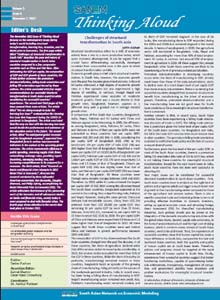
Thinking Aloud: Volume IX, Issue 6: November 1, 2022
 The November 2022 issue of Thinking Aloud focuses on the contemporary issues facing today’s world including structural transformation, learning loss, recession, and the Nobel prize in Economics. The first page article titled “Challenges of structural transformation in South Asia” describes the pace and nature of structural transformation in South Asian countries compared to a few comparator countries such as China and Viet Nam. After delineating the GDP per capita, the composition of GDP and GDP growth of these countries, the article further examines the premature deindustrialization, falling trade orientation and falling FDI orientation experienced by these nations. The article concluded with four major recommendations for successful structural transformation in South Asian countries while considering the successful countries’ experiences. The second and third pages of this issue present three more articles. The article titled “Are we doing enough to solve the learning loss issue?” contextualises the learning loss issue that happened during the COVID-19 pandemic in Bangladesh. The article concluded that the way we deal with the learning loss issue would decide the performance and substance of the education sector in the future. The second article, titled “An anticipated global recession and the Bangladesh economy”, appraised how Bangladesh fares in various macroeconomic indicators in the context of the upcoming global recession. The article recommends efficiency in public spending, removing supply chain flaws, rationalising exchange rates, providing export incentives, managing lending rate, and increasing competitiveness to be prepared for a recession. The third article, titled “Research on banks and financial crises triumphs in 2022 Nobel Prize in Economics”, discusses the research conducted by three influential American economists- Ben Bernanke, Douglas Diamond, and Philip Dybvig, accomplishing the Nobel Memorial Prize in Economics 2022. The article articulates that because of the pioneering work of the laureates and all subsequent studies on banks and financial crises, society today is more prepared to deal with financial crises. The fourth page draws attention to the events that took place in October 2022.
The November 2022 issue of Thinking Aloud focuses on the contemporary issues facing today’s world including structural transformation, learning loss, recession, and the Nobel prize in Economics. The first page article titled “Challenges of structural transformation in South Asia” describes the pace and nature of structural transformation in South Asian countries compared to a few comparator countries such as China and Viet Nam. After delineating the GDP per capita, the composition of GDP and GDP growth of these countries, the article further examines the premature deindustrialization, falling trade orientation and falling FDI orientation experienced by these nations. The article concluded with four major recommendations for successful structural transformation in South Asian countries while considering the successful countries’ experiences. The second and third pages of this issue present three more articles. The article titled “Are we doing enough to solve the learning loss issue?” contextualises the learning loss issue that happened during the COVID-19 pandemic in Bangladesh. The article concluded that the way we deal with the learning loss issue would decide the performance and substance of the education sector in the future. The second article, titled “An anticipated global recession and the Bangladesh economy”, appraised how Bangladesh fares in various macroeconomic indicators in the context of the upcoming global recession. The article recommends efficiency in public spending, removing supply chain flaws, rationalising exchange rates, providing export incentives, managing lending rate, and increasing competitiveness to be prepared for a recession. The third article, titled “Research on banks and financial crises triumphs in 2022 Nobel Prize in Economics”, discusses the research conducted by three influential American economists- Ben Bernanke, Douglas Diamond, and Philip Dybvig, accomplishing the Nobel Memorial Prize in Economics 2022. The article articulates that because of the pioneering work of the laureates and all subsequent studies on banks and financial crises, society today is more prepared to deal with financial crises. The fourth page draws attention to the events that took place in October 2022.



